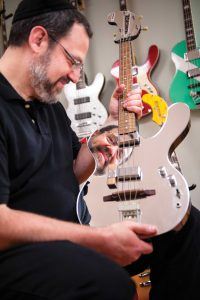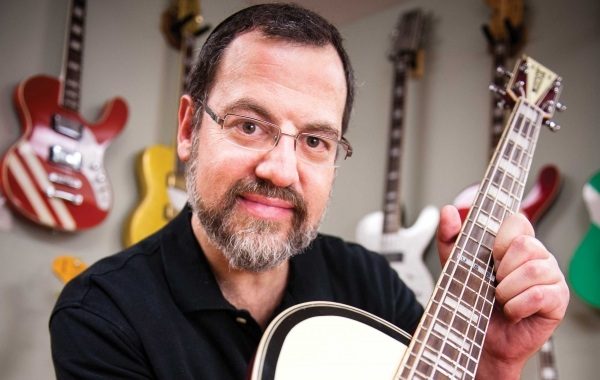There are countless people whose mouths bear testament to the work of SJ oral surgeon Matt Eichen. But there are others who have availed themselves of Eichen’s talents – including country titan Toby Keith and rock stars Tom Petersson of Cheap Trick and C.C. DeVille of Poison – even though he has never been anywhere near their mouths.
That’s because the Cherry Hill resident operates simultaneously in two very different worlds. In addition to his longtime practice, Eichen, 52, is also the founder, CEO and chief designer of the Musicvox guitar line.
While the 17-year-old company doesn’t quite play in the same league as mega-brands like Fender and Gibson, Musicvox has a loyal international following. It also has a film credit: Mike Myers OK’d the use of Eichen’s guitars in his film “Austin Powers in Goldmember.” The comical super-sleuth played by Myers sings a song backed by a band playing Eichen’s guitars.
Musicvox instruments are hardly your regulation guitars. The designs are eye-catching and unusual, especially the Spaceranger guitars and bass guitars, which look like something from an episode of “The Jetsons,” with their dramatically protruding “horns” and oddly curved head pieces.
Not that the Queens, N.Y., native, who grew up mostly in Central Jersey, ever envisioned himself a musical instrument tycoon. His entry into that business was accidental, an outgrowth of his love of music and a certain type of guitar.
 A self-taught musician and the married father of three teenagers (two daughters and a son), Eichen played in bands throughout high school and while getting his undergraduate degree at Rutgers University. But he knew early on that dentistry, not rock ‘n’ roll, was his destiny.
A self-taught musician and the married father of three teenagers (two daughters and a son), Eichen played in bands throughout high school and while getting his undergraduate degree at Rutgers University. But he knew early on that dentistry, not rock ‘n’ roll, was his destiny.
“The art and science of oral surgery is something I’ve been attached to since the age of 19,” he says. “I was very fortunate; as a kid I had the chance to volunteer at a hospital in Edison. The first day I got in there I was hooked. I watched an oral surgeon extract a tooth, and I just remember standing at the end of the chair thinking, that’s exactly what I want to do.
“I spent every minute I could to develop myself in preparation for this. I just have such a tremendous love for the art and science and practice of oral surgery. It’s such a part of me that I could not really think of throwing it away. It’s never crossed my mind to divorce myself from it in any way.”
But neither could he consider severing his musical ties.
After graduating from the University of Medicine and Dentistry of New Jersey in Newark, Eichen served his residency at New York’s Mount Sinai Hospital. It was there he caught a peculiar bug.
“I always had a taste for garage rock,” he says, referring to a sub-genre first popular in the mid- to late-1960s. According to Eichen, some of the members of these bands played guitars bearing brand names like Silvertone, Harmony and Echo. These tended to be somewhat adventurous in their designs, and their price points were far below those of top-line manufactures like Fender, Gibson, Rickenbacker and Guild.
“A friend of mine who I played in a band with said, ‘These are great instruments, you should buy them mail-order,’” Eichen says.Eichen followed his pal’s advice and bought a 1967 Echo violin-shaped bass. That’s all it took to put him on a track he never saw coming.
“I was hooked,” he says. “When I was in training, all my salary went to rent and Chinese food. If I had $200 left over every few months, I’d look to buy a guitar – Harmony, Sears Silvertone, Echo violin bodies. By the time I ended my residency, I had maybe six or eight guitars in the $200-$250 range. I just thought they were cool.”
Eichen moved to Cherry Hill in 1990 and began his dental career. But starting a practice – and a family – didn’t leave him much in the way of time or resources to pursue his hobby. He eventually established himself professionally and found he had both the time and money to indulge his fondness for the instruments he loved. His renewed passion for what he calls “vintage, consumer-priced guitars” grew from mere collecting.
Eichen began making sketches of a guitar he hoped to have custom-built for his personal use. He contacted Oregon-based stringed-instrument builder Ken Warmoth and asked him to turn his drawings into a playable instrument.
Warmoth quickly discouraged Eichen, citing the high cost of the project. Given the expense and time involved in making a single guitar, Warmoth told him, he’d be better off mass-producing his concept. “That,” he says, “was the kick I needed to get started.”
By December 1996, about a dozen prototypes had been assembled. A month later, he packed up his guitars and headed to an annual trade show sponsored by the National Association of Music Merchants, where his Spaceranger was both lauded and loathed.
“Ten to 20 percent of the people at the show fell in love with it. They said, ‘I get it,’” he says. “And a substantial number of people looked at it and said, ‘Why?’ There was a journalist from Sweden who came by the booth and said ‘Vy you do such a thing?’ There was no neutral at all.”
But both the trade and consumer press took notice. Through them, musicians like Petersson, DeVille and Steve Howe of the rock band Yes discovered and embraced the Musicvox line.
The company was poised to explode by the time the new millennium arrived, especially after singer-songwriter Matthew Sweet got Myers and “Goldmember” director Jay Roach to allow the use of Musicvox guitars in the flick. But then near-tragedy struck when Eichen’s youngest child, Goldie, developed what he describes as a “serious illness.” For the next decade, Musicvox was in limbo as Goldie, who has fully recovered, was nursed back to health.
About a year ago, his two older children, Hannah, 18, and Gershon, 16, began asking questions about their dad’s guitar collection, which occupies most of their home’s wall space, as well as about the numerous newspaper and magazine articles they’d found about the Musicvox line.
He told them the story, and they – especially Hannah – responded by asking him why he still didn’t design and market the guitars, which are manufactured in South Korea. Eichen replied that if they were willing to pitch in, they could revive the business.
Today, Hannah, who is attending Yeshiva University’s School of Business in New York on a full scholarship, handles accounts payable and receivable, trade show appearances and artist relations. (Celebrity endorsements are crucial in the industry, Eichen says.)
Eichen, who is the sole owner of Musicvox, says he has had some discussions with larger companies that were interested in buying him out, but he has no interest in such a transaction.
“To me, it’s a business, but it’s an enjoyable thing,” he says. “It takes me away from work. Any spare time I have I spend on that.”












